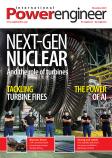The utilities industry is facing its biggest challenge in modern times according to the eighth annual PricewaterhouseCoopers report The Big Leap: Utilities Global Survey 2006.
According to the report, two-thirds of the world’s leading utility company leaders hold this view with the majority rating the changes that the industry will have to undergo as little short of revolutionary. This sentiment is felt most strongly in Europe (72 per cent), which is grappling with conflicting challenges including supply and demand imbalances, infrastructure vulnerability and environmental concerns.
The industry is ready to make a big leap forward with nearly two thirds believing the industry needs to adopt a 10 year focus on reducing environmental damage, developing new technologies, improving customer service relationships and finding new fuel sources.
However, many feel that policy-makers also have to make a leap. Eight per cent of respondents believe political and regulatory factors are inhibiting the ability of the sector to respond to these challenges, and shock factors such as supply or environmental crises may need to occur to force change.
The report which presents the views of 116 senior executives from leading utilities companies in 43 countries shows security of supply remains their primary concern as it has over the past two years, particularly in Europe where twice as many utility leaders believe prospects for power cuts have increased rather than diminished compared to five years ago. Many within the industry believe the pace of change needs to be stepped up to face the challenges that lie ahead. Forty-two per cent, for example, said the sector is lagging behind in the development of renewable energy sources.
Regulatory uncertainty continues to affect investment in the sector and was cited as one of the top three concerns amongst the utilities companies polled. Meeting projected supply needs will require an investment of US$13 trillion by 2030 in power generation, transmission and distribution and gas-supply infrastructure yet 42 per cent of respondents felt that government or regulatory policy restricted their ability to develop long-term plans.
Manfred Wiegand, Global Utilities Leader, PricewaterhouseCoopers said: “Our report highlights yet again the need for the industry to work with government and investors to make the infrastructure, technological, environmental and investment leaps that need to happen to arrive at a long term sustainable solution.
“We can expect to see a future power and gas utilities sector that is radically different from now. On the ownership and sector structure front, we will see many fewer and much larger super-regional generation and distribution companies, greater fusion of upstream and downstream energy and a continued move of infrastructure entities into private investment fund ownership. On the customer front, we will have the prospect of much greater end-user involvement in both industrial-scale power projects and smaller and more medium-sized distributed power.”
Across all of the industry, technology will be a key driver and investment in technology, particularly in clean coal generation, will be a key determinant in the extent to which greenhouse gas growth is mitigated. Coal and nuclear will play a larger part in the fuel mix.
Finally, many in the industry feel there is the very real prospect of ‘cap and trade’ emission control schemes being extended around the world.
The PricewaterhouseCoopers ‘The Big Leap’ report also highlights other key developments in the utilities sector:
* M&A activity at record levels: Both the value of total deals and the size of deals are at record levels. Total deal value soared to US$196bn in 2005 from US$123bn in 2004.
* Coal tops favoured fuel supplies: Coal ranks alongside gas as the fuel expected to make the biggest contribution to meeting demand growth in the next five years.
* Nuclear ready to step up: Half of the respondents in the Americas and Europe and 44 per cent of all respondents said they expect nuclear capacity to increase in their region as a result of concerns about climate change.
* Technological advances: Companies are increasingly looking to technological innovation to deliver efficiencies and respond to the pincer of future demand challenges and environmental concerns.
For more information, visit www.pwc.com/energy
"
















